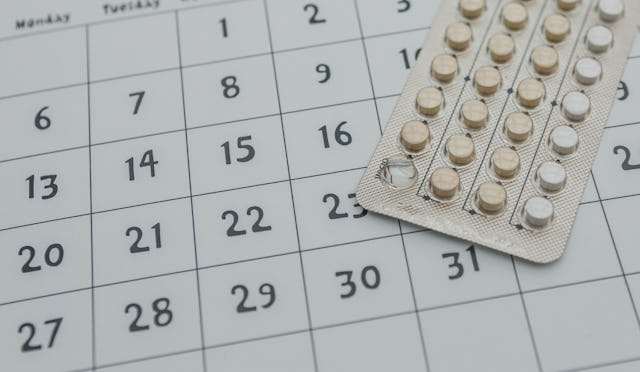If You Have A Short Menstrual Cycle, This Is What An OB-GYN Says You Should Know
First up: What’s considered “short”?

Periods can cause bloating, cramps, diarrhea, and acne — to say the least. So, it makes sense that a shorter menstrual cycle with minimal symptoms probably sounds like music to your ears. Of course, there's no such thing as a "normal" menstrual cycle, as it can differ widely from person to person. Commonly, though, bleeding between three to seven days, with a full menstrual cycle lasting from 21 to 35 days, is considered healthy.
While a short menstrual cycle might seem like a dream, if your menstrual cycle falls on the shorter side, it can signal that something could be amiss with your body. If that's the case, here's what you need to know about your health and when to connect with a doctor.
What is considered a shorter menstrual cycle?
According to Dr. Barbara McLaren, a board-certified OB-GYN and co-founder of Kushae feminine wellness products, a short menstrual cycle is anything shorter than three days. A shortened cycle length would be having a period less than three weeks apart.
If you're experiencing a shorter cycle length, Dr. McLaren advises that it should be evaluated by a physician, as a number of things can cause it. This includes fibroids, endometrial polyps, cancer or precancer, and infection, to name a few. "In addition, if a woman is bleeding that often, it may lead to anemia. Evaluation by a gynecologist can identify the cause of this abnormal pattern of bleeding."
Why might my menstrual cycle be getting shorter?
Dr. McLaren says there are many reasons why your menstrual cycle might be shorter.
"The first reason is related to age. As women get closer to menopause, they can either experience lighter or heavier periods than they are used to," she says. "A change in your cycle can be due to waning hormone levels, which happens as you age and get closer to menopause. The menstrual cycle is controlled by hormone production of estrogen and progesterone. Once menopause is reached, your body no longer produces these hormones, and for some women, the deficiency in these hormones can cause bothersome symptoms."
Additionally, certain health conditions can contribute to menstrual changes, such as thyroid disease, which can be checked out by your doctor.
Dr. McLaren also notes that the use of hormonal contraception will usually result in lighter, less painful periods, and breastfeeding moms may experience lighter, shorter periods.
Other reasons that can affect the duration and frequency of your cycle include younger women entering puberty who might also have short and irregular periods, as well as excessive exercise, eating disorders, and stress.
As for whether periods get shorter with age, Dr. McLaren says they can "but not necessarily. It varies from person to person."
Does a shorter period mean I'm less fertile?
"A shorter period can be an indicator of aging, which is associated with infertility or sub-fertility," Dr. McLaren says, adding that hormone tests can gauge your ovarian reserve. "Your doctor can perform this test to determine your likelihood of getting pregnant and having a live birth."
Should I worry about shorter periods?
Dr. McLaren acknowledges that most women don't enjoy having a period (see cramping, bloating, cravings, etc.), and experiencing issues can be even more stress-inducing. But she reassures that minor changes to your cycle from time to time over your reproductive years are to be expected. "This is not cause for concern. As a gynecologist, I am more concerned if a woman is not having period at all (before menopause), is having longer cycles (>7 days), or [has] heavy periods as it may be a sign of an underlying disease."
If you have any questions about your menstrual cycle, it's always best to talk to your medical doctor.
Expert Source:
Dr. Barbara McLaren, board-certified OB-GYN and co-founder of Kushae feminine wellness products
This article was originally published on